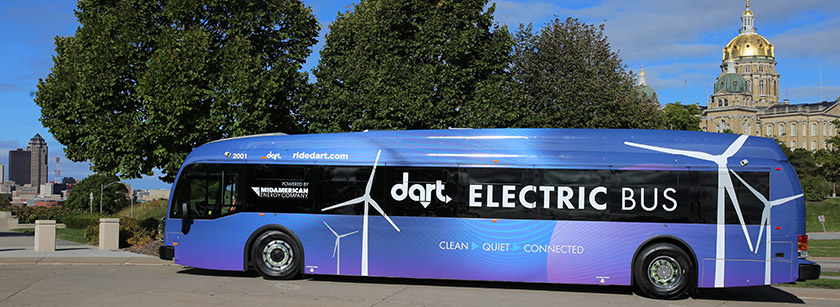Conversation During Partnership's D.C. Trip Leads to Iowa's First All-Electric, Zero Emissions Bus

Against the backdrop of Downtown Des Moines on a crisp October morning, we unveiled Iowa‘s first, all-electric zero emission bus. In the coming months the Des Moines Area Regional Transit Authority (DART) will have seven all-new, all-electric buses in in its fleet, and while it is said the journey of a thousand miles begins with a single step, in DART’s case it started with a single conversation. Several years ago, I was on the Greater Des Moines Partnership’s annual trip to Washington, D.C. and was talking with Kathryn Kunert from MidAmerican Energy about the possibility of bringing electric buses to Greater Des Moines (DSM). MidAmerican agreed to partner with DART on our Low- or No-Emission grant application, which made DART eligible for $1.45 million in federal funding. That funding was the catalyst that put in motion our ability to invest in seven Proterra Catalyst buses.
This is what is so great about our region — the spirit around public-private partnerships and how we turn discussions and ideas into action!
Testing Technology, Evaluating the Benefits
Later this year, we will begin testing the electric buses and moving them into service on Route 60, which is the Ingersoll/University Avenue loop in DSM. We know that to fulfill our mission, we need to provide the best customer experience we can at the lowest possible cost. This is why we are often an early adopter of new technology, like these electric buses, that will improve the customer experience and save DART money in operating and maintenance costs.
While electric buses cost more than a diesel bus, there is a significant savings in operating and maintaining these vehicles. Industry estimates suggest a 78% reduction in fuel cost and 18% reduction in total cost of ownership. Thanks to federal grant programs, such as the FTA Low- or No-Emission grant and the EPA DERA grant, and financial support from MidAmerican, DART was able to purchase these buses without incurring any additional cost above and beyond what it was scheduled to pay in replacement diesel buses.
DART will spend the first 12 months closely monitoring and evaluating how the buses perform both individually and against their diesel counterparts. Key performance indicators DART will monitor include:
-
Range monitors how far the vehicles will travel on a full charge. We will also measure what factors affect the range of the vehicle and how we can manage these factors to maximize range and minimize expense.
- Down time, which is the amount of time a bus is not operational due to maintenance.
- Cost of preventative maintenance. With 30% fewer parts, the electric buses should need less maintenance and also experience less brake wear due to the braking system.
• Fuel cost and energy expense.
- Long-term viability of the carbon fiber composite body. Normal bus bodies corrode and rust over time, typically in 13–15 years.
Partnerships for a Healthier Community
DART prides itself on having strong partnerships. Many of these partnerships enable employees, shoppers and students to travel around our communities and connect with jobs, businesses, appointments and essential services. DART is committed to having a state-of-the-art bus fleet that is sustainable — both environmentally and financially — and our partnership with MidAmerican brings that vision and commitment to life. Along with a shared commitment to renewable energy, our partnership will make for a healthier community for all.
We are also grateful for the support our elected officials, both here and in D.C., who are champions for essential services such as public transit and helping us adopt new technology, as well as the representatives from our 12-member communities who serve on DART’s Board of Commissioners and champion our strategic vision and oversee investments to best serve the region.
Electrifying Insights
CLEAN
The Proterra Catalyst bus has a 100% electric propulsion system. Each time an electric bus replaces a diesel bus, 230,000 pounds of greenhouse gases are avoided each year. That is the equivalent to planting 5,000 trees!
QUIET
Without a combustion engine, riders enjoy quieter experience aboard the electric bus and the wider community benefits from reduced noise pollution. It is said the buses are 50% quieter than their diesel counterparts, but from my experience I think it is even quieter than that assessment suggests. In fact, during the unveiling we had a second all-electric bus pull up behind the crowd just a few feet away, and no one heard it!
CONNECTED
With just one charge, DART’s electric buses can travel an estimated 150-200 miles. And riders can plug in while riding thanks to each seat having a USB port.
Interested in more fun facts? Here’s a quick one-sheet of additional information.
Listen to a recent podcast from Elizabeth Presutti on Leading in Times of Challenge here.
I hope you will have the opportunity to ride on one of the all-electric buses when they are in service in the coming months. In the meantime, thank you for taking the time to learn more about this important pilot program to introduce zero emissions buses that are CLEAN, QUIET and CONNECTED to our mission of enriching lives, connecting communities and expanding opportunities for all DSM residents.
Downtown Des Moines (DSM) is a growing, vibrant community that offers the energy, sophistication, housing and attractions of a burgeoning city with a brilliant future. It’s also easy to visit with plentiful and affordable street and ramp parking options.
Named the #5 Best Place to Live in the U.S. and a Top 10 Best Place for Business and Careers, Greater Des Moines (DSM) is a city where you can have it all. Learn more about what it’s like to live here.
Elizabeth Presutti
Elizabeth Presutti is CEO of Des Moines Area Regional Transit Authority (DART), the largest public transportation system in the state of Iowa.